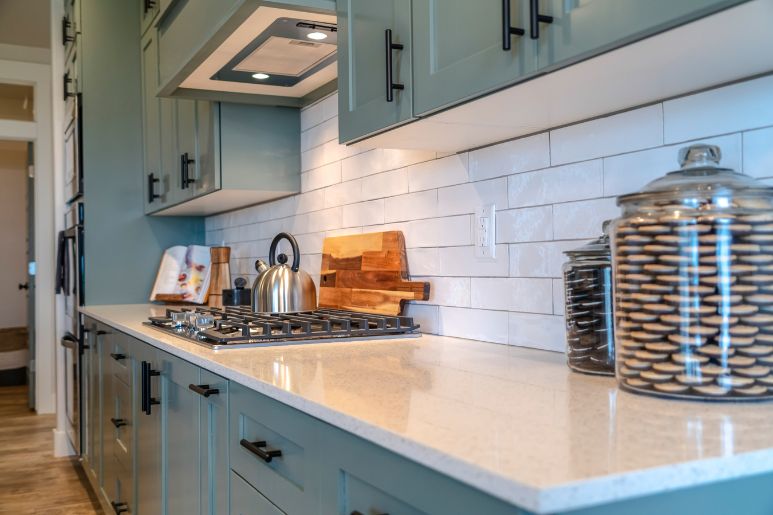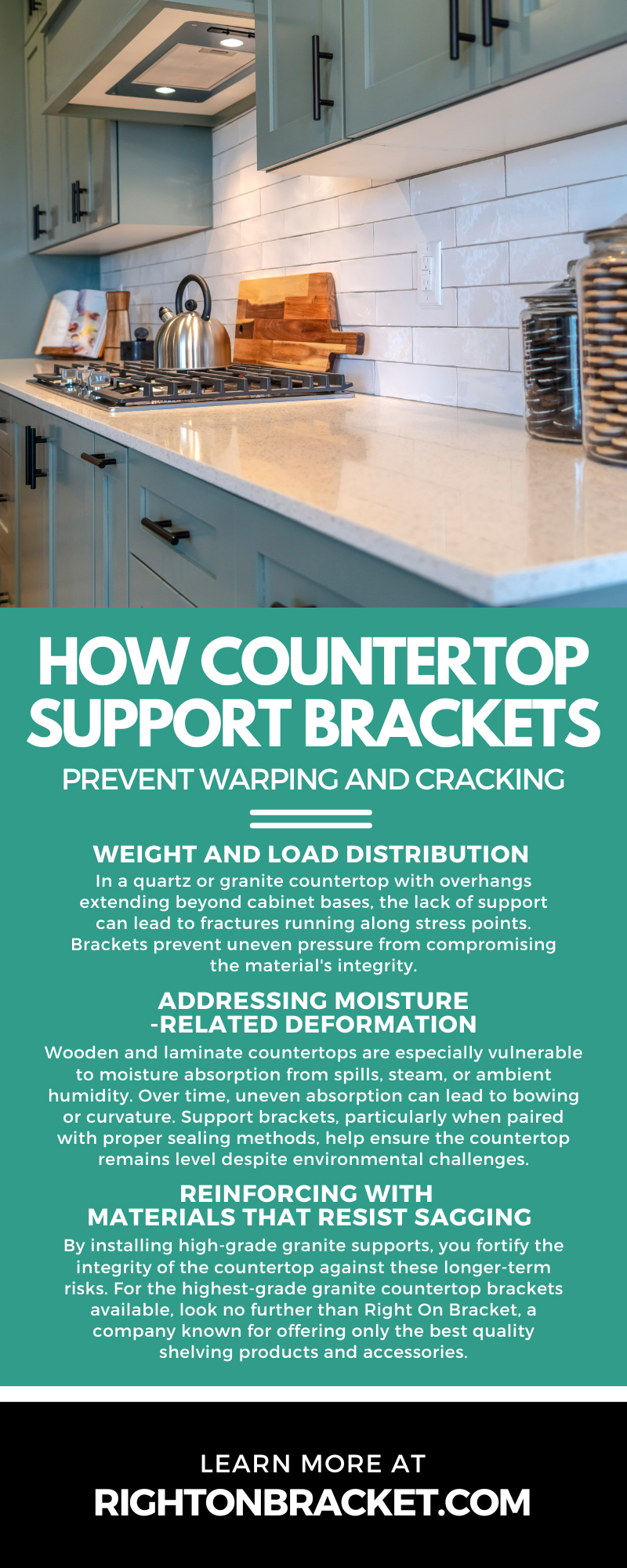
How Countertop Support Brackets Prevent Warping and Cracking
Countertops are a central feature in kitchens, bathrooms, and work areas, providing both functional workspaces and aesthetic appeals. While they can endure significant use and weight, issues such as warping and cracking can occur over time.
These problems often arise due to insufficient structural support, leading to costly repairs or replacements. This is where countertop support brackets come into play.
How do countertop support brackets prevent warping and cracking? We’ll explore the structural features that allow them to counteract stress factors, ultimately making them a practical solution for maintaining long-term stability.
The Need for Countertop Support Brackets
Natural and engineered stone, wood, concrete, and even laminate countertops are vulnerable to stress depending on their length and material composition. Likewise, unsupported overhangs are common in kitchen islands, breakfast bars, and other designs.
This creates weak points that may buckle under pressure. To combat weak points, engineers designed countertop support brackets to distribute weight evenly and bolster areas most prone to strain.
Weight and Load Distribution
Countertops often bear the load of heavy kitchen appliances, food preparation activities, and daily general use. Support brackets act as skeletal reinforcements, relieving the burden on unsupported sections.
For instance, in a quartz or granite countertop with overhangs extending beyond cabinet bases, the lack of support can lead to fractures running along stress points. Brackets prevent uneven pressure from compromising the material’s integrity.
Impacts of Environmental Changes
Temperature and humidity variations significantly influence your countertop’s performance. Wooded and laminate countertops, for example, expand and contract with climate changes, which might lead to warping.
Strategically placed support brackets protect against shifting stresses by creating tightly anchored fixed points. This structural protection helps minimize movement caused by these external elements.
Preventing Warping
Warping occurs when a countertop bends or deforms. Common causes of this issue include:
- Prolonged exposure to moisture
- Improper installation
- Excessive pressure
Once a countertop warps, the surface may no longer remain level, affecting its appearance and functionality. Countertop brackets prevent warping by offering sturdy, immovable support beneath the surface.
Addressing Moisture-Related Deformation
Wooden and laminate countertops are especially vulnerable to moisture absorption from spills, steam, or ambient humidity. Over time, uneven absorption can lead to bowing or curvature. Support brackets, particularly when paired with proper sealing methods, help ensure the countertop remains level despite environmental challenges.
Reinforcing With Materials That Resist Sagging
For heavier materials like granite, marble, or concrete, warping may not stem from moisture but from weaknesses at unsupported ends. Without brackets, these materials can sag over time, creating an uneven surface and compromising structural integrity.
By installing high-grade granite supports, you fortify the integrity of the countertop against these longer-term risks. For the highest-grade granite countertop brackets available, look no further than Right On Bracket, a company known for offering only the best quality shelving products and accessories.
Implementing our durable floating countertop brackets guarantees the floating countertop in your kitchen won’t sag, warp, or weaken because of environmental factors or daily stressors. Handcrafted to support counters that hold hundreds of pounds, these structures make sure you can store even the heaviest items on your counter’s surface without worries.
Preventing Cracking
Cracks occur when stress exceeds a material’s ability to bend or stretch. These fractures can start as minor imperfections but expand with ongoing pressure cycles. Countertop support brackets play a key role in absorbing and deflecting these stresses before they accumulate, preserving the structure’s core strength.
Managing Overhang Stresses
Countertops with significant overhangs, such as those on kitchen peninsulas or bars, are at heightened risk for cracking. Heavy objects placed near edges can exert profound pressure on these unsupported sections. L-brackets and corbels, designed to bear such weight, serve as preventive measures to ensure that stress is distributed across a broader area rather than concentrated on vulnerable corners.
Protecting Seam Points
For countertops composed of multiple slabs or sections, seams are another weak point where cracking may originate. Properly installed brackets serve as backup support beneath these critical junctures, minimizing the risk of fractures that might otherwise spread at connection points.
Choosing the Right Countertop Brackets
Now that you understand how countertop support brackets prevent warping and cracking, you need to select appropriate brackets. There are several types, materials, and designs available, each suited to specific materials, dimensions, and applications.
Material Choice
Brackets commonly consist of granite, steel, or aluminum due to their durability and resistance to wear. Powder-coated variants provide additional protection against rust and corrosion, which is particularly valuable in humid environments.
Designs
The design of a bracket depends on the countertop’s intended functionality. Low-profile brackets are ideal for maintaining a clean, minimalist look, whereas decorative brackets double as aesthetic flourishes. Heavy-duty L-brackets or gusseted supports are the go-to solutions for supporting oversized overhangs or extremely heavy materials like concrete and granite.
Weight Rating
Always ensure that the brackets can support the combined weight of the overhang, countertop material, and any objects you’ll place on top. This involves consulting supplier specifications and checking the ratings explicitly mentioned for each product.
Maximizing Protection With Proper Installation
Properly integrating support brackets is crucial to achieving their intended benefits. Poor installation or inadequate spacing can compromise their effectiveness, rendering them ineffective and eliminating the stability they’re meant to provide.
Optimal Spacing
Install brackets at regular intervals, depending on the countertop’s material and dimensions. Heavier countertops generally require close placement between supports. Particularly long or expansive overhangs may need adjusted spacing to accommodate additional stress.
Secure Anchoring
Place brackets into sturdy frameworks such as wall studs, cabinetry, or solid concrete bases. Fasteners that bite into drywall or other weak substrates will not offer reliable support. Use lag bolts or heavy-duty screws to secure brackets firmly into place.
Maintaining and Inspecting Support Brackets
Once installed, routine inspections and maintenance will help bracket systems perform effectively throughout the countertop’s lifespan. Look for signs of rust or corrosion and address these issues promptly.
Checking Structural Integrity
Inspect brackets periodically to confirm they remain securely fastened. Over time, vibrations and repeated loads may loosen screws or bolts. Tightening connections as necessary avoids instability.
Cleaning and Coating
Clean any brackets exposed to moisture or humidity thoroughly to remove residues like grease or water deposits. Applying a UV-resistant powder coating or protective finish increases their resistance to corrosion and wear.
The Broader Impact of Support Brackets
Countertop support brackets extend countertop durability significantly. By acting as safeguards against environmental and mechanical stressors, they reduce the likelihood of costly replacements and professional repairs.
If you’re considering a countertop upgrade or noticing wear on your current setup, investing in high-quality support brackets is a wise step forward. Their practical contribution to lasting surfaces makes them a worthwhile addition to any countertop installation. Ultimately, the right support brackets will help you maintain a flawless and functional countertop for years to come.



